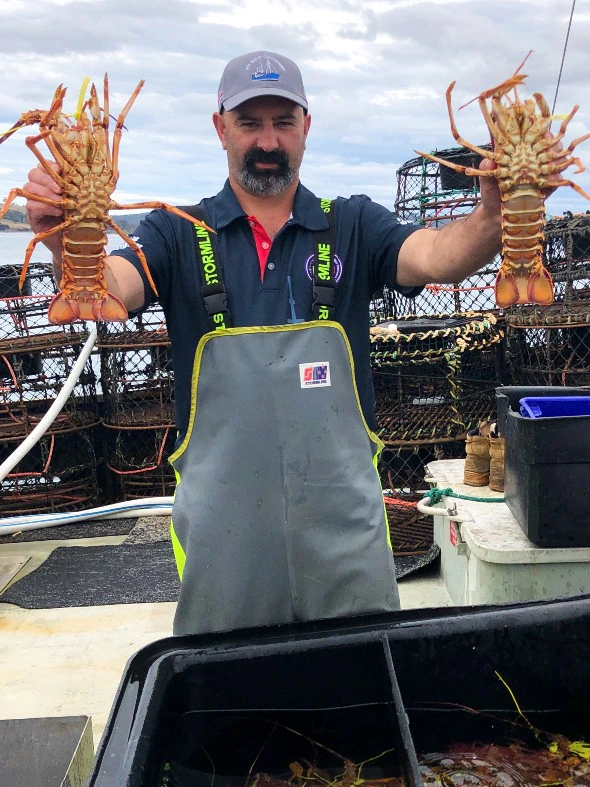Easter is a hectic time in the lobster business as fishers, processors and retailers cash in on the seafood sales boom.
Key points:
- The China trade ban, freight issues, COVID outbreaks and bad weather have again seen lobster sales dive
- While the catches have been good, some fishers are struggling to break even
- Consumers are paying as low as $35 each for a 700-gram lobster
But this year, many boats remain in port and the processing plants are unusually quiet.
“We’ve asked the boats to not go fishing,” said Michael Blake, Tasmanian manager of lobster processor SALCO.
A dramatic collapse in export markets has flooded Australia with large quantities of cheap lobsters selling for as little as $35 a kilogram.
At that price, fishers struggle to break even and processors are not getting enough orders to chew through the oversupply of fish, with one describing the price as “nearly as cheap as chocolate”.
“I’m hearing fishermen struggling to maintain deckhands because they’re not earning enough money, fishermen talking about having to get a second job,” Mr Blake said.
“It’s been very challenging.”
‘Worst I’ve ever seen’
Fishers used to sell lobsters into China for around $100 per kilogram but the industry has been locked out of that market since the outbreak of COVID-19.
Ongoing lockdowns and disruption to international freight are still making it tough to sell abroad and the situation is not much better at home.
Fishers from Tasmania to Western Australia are all competing for the small pool of Australian buyers and major flooding across the eastern seaboard has left restaurants closed, supply chains splintered and locals with little spare change.
Veteran fisher Rodney Clarke pulled into port with a load of lobsters this week and does not expect to head out again any time soon.
“I’m not going back while you can’t sell any,” he said.
Mr Clarke has been in the lobster game for 43 years but sees little point spending long and tiring weeks at sea for little return.
“I’ve been thinking of getting out of it and this has just about made up my mind,” he said.
“I thought last year was bad but this year is bloody worse.”
The only way Squizzy Taylor has been able to make ends meet is by selling lobster straight off his boat to customers at the Hobart waterfront.
He is very grateful for the locals who have supported his business but fed up with the current circumstances.
“It’s just so hard to make things work. You can’t plan anything,” he said.
The significant operational expenses associated with lobster fishing mean staying at the docks is not a viable long-term option.
Vessels rack up thousands of dollars in insurance and maintenance costs and many fishers have already put down big money to buy “quota”, or the right to catch a certain amount of lobster per year.
Mr Taylor said he was “working twice as hard” but “not making any money”.
He said unless export markets opened up, the industry would have no future.
“Everything has gone up this year: fuel, bait, lease for quota. Everything has gone up but lobster hasn’t. They are nearly the same price as chocolate,” he said.
Charting rough waters
While export markets remain out of reach, lobster fishers need local buyers to keep them afloat.
Jennie Cox has often bought lobsters off the docks and said she was “pretty keen” to do what she could to support Tasmanian fishers.
“I see the sadness of what’s happening locally with the lack of being able to export,” she said.
“But at the same time, it’s really wonderful that we can come out and enjoy seafood and encourage others to come support our industry.”
As the Chinese market remains out of reach, Mr Blake said SALCO was trying to build opportunities in new markets such as Singapore, Vietnam, the US and New Zealand.
“But right now, we’ve still got the same problem we’ve had: COVID keeps causing lockdowns in these cities in these countries, border clearance and things like that are being delayed because they don’t have the staff to clear products, planes are getting cancelled because pilots have got COVID,” he said.
Mr Blake was optimistic SALCO could survive because it was investing in new cooking facilities and value-adding products.
“If you sit still, you’re possibly going to be in trouble. So I’m confident we’ll get through but it’s just going to take some time,” he said.




